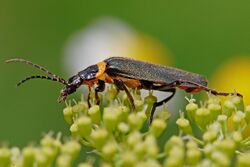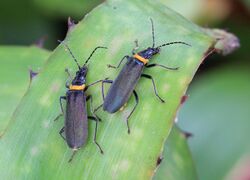Biology:Chauliognathus lugubris
| Chauliognathus lugubris | |
|---|---|

| |
| Scientific classification | |
| Domain: | Eukaryota |
| Kingdom: | Animalia |
| Phylum: | Arthropoda |
| Class: | Insecta |
| Order: | Coleoptera |
| Family: | Cantharidae |
| Genus: | Chauliognathus |
| Species: | C. lugubris
|
| Binomial name | |
| Chauliognathus lugubris Fabricius, 1801
| |
Chauliognathus lugubris, the plague soldier beetle, green soldier beetle or banana bug,[1] is a species of soldier beetle (Cantharidae) native to Australia.[2] It has a flattened body to 15 millimetres (0.59 in) long with a prominent yellow-orange stripe behind the black prothorax.[3] The abdomen is yellow-orange but is mostly obscured by the metallic olive green elytra.[3]
Plague soldier beetles are most common in spring and early summer, and have an adult lifespan of 2-3 months.[4] They are most commonly found in the temperate region of southeast Australia,[5] and are occasionally found in parts of the southwest.[6]
The beetles often swarm in large, localised groups around flora such as shrubs and trees, primarily to mate and eat.[3][5][7] These swarms can include hundreds of thousands of beetles.[8]
As adults, plague soldier beetles are thought to feed on pollen and nectar.[5] While in their larval stage, plague soldier beetles live in soil and are thought to feed on smaller, soft-shelled invertebrates.[5][9]
External links
References
- ↑ "Plague Soldier Beetles". 3 December 2012. https://www.whatsthatbug.com/2012/12/03/plague-soldier-beetles/. Retrieved 2 August 2021.
- ↑ "Chauliognathus lugubris (Fabricius)". CSIRO. http://www.ces.csiro.au/aicn/system/c_559.htm. Retrieved 3 January 2013.
- ↑ 3.0 3.1 3.2 "Plague Soldier Beetles". Museum Victoria. http://museumsvictoria.com.au/about/mv-blog/?tag=chauliognathus%20lugubris. Retrieved 3 January 2013.
- ↑ Shohet, D.; Clarke, A.R. (1997). "Life History of Chauliognathus lugubris (F.) (Coleoptera: Cantharidae) in Tasmanian Forests.". Australian Journal of Entomology 36 (1): 37–44. doi:10.1111/j.1440-6055.1997.tb01429.x.
- ↑ 5.0 5.1 5.2 5.3 Pullen, Kim (8 November 2012). "The Plague Soldier Beetle isn't nearly as bad as it sounds". CSIRO. https://blog.csiro.au/insect-of-the-week-the-plague-soldier-beetle-isnt-nearly-as-bad-as-it-sounds/. Retrieved 2 December 2022.
- ↑ "Chauliognathus lugubris: Plague Soldier Beetle". Atlas of Living Australia. https://bie.ala.org.au/species/urn:lsid:biodiversity.org.au:afd.taxon:f2e72f0f-4ce1-4b58-99e2-19c874e88348. Retrieved 7 May 2021.
- ↑ "Plague Soldier Beetle". 8 December 2020. https://australian.museum/learn/animals/insects/plague-soldier-beetle/. Retrieved 3 December 2022.
- ↑ Hawkeswood, Trevor J.; Dunn, K. L. (2011). "An instance of mass swarming by the Australian soldier beetle, Chauliognathus pulchellus (Macleay) (Coleoptera: Cantharidae) at Leura, Blue Mountains, New South Wales". Calodema 155 (1): 1–4. https://www.researchgate.net/publication/305722467. Retrieved 3 December 2022.
- ↑ Chauliognathus lugubris (Fabricius, 1801), Plague Soldier Beetle, Museums Victoria, https://collections.museumsvictoria.com.au/species/8533, retrieved 12 May 2023
Wikidata ☰ Q5088177 entry
 |


